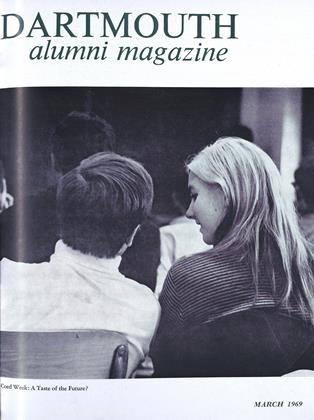By Donald L. Smith '51.New York: Teachers College Press, Columbia University, 1968. 134 pp. $5.25.
To the young, great men and great events in history seem more remote than great. An intimate feeling for dead heroes is difficult to achieve. High schools lack books and research material. College libraries may be so rich as to bewilder. Pupils and students have too little time to locate and examine multiple sources so important for mature historical insights.
What can be done, for example, in the study of John Jay, respected and influential in his day, as his principles and behavior affected the major political and diplomatic issues of 1774 to 1789?
Mr. Smith, Associate Professor at Adelphi and Director of Graduate Education at Adelphi-Suffolk College, has come up with a practical answer. In a brief volume, 134 pages, with the help of a four-page bibliography (works by John Jay and his contemporaries, other primary sources, works about Jay, secondary sources, and monographs), he has assembled 47 readings with comments. Mr. Smith wishes to excite students by plunging them into the troubles, dangers, and frustrations of our early American history and to make vivid the undramatic John Jay and understandable his influence in the successful struggle for independence, the creation of the State of New York, and the establishment of a strong constitutional government for the United States.
This book attempts to do what conventional textbooks, forced into superficial brevity, cannot when they treat the years during which the thirteen colonies established their independence and a new federal union was crowded with events. From the published papers of John Jay, Mr. Smith throws light on such complicated problems as why prosperous subjects of the King were organized to achieve independence, how the colonies established new state governments, what policy was established to deal with persons who remained British loyalists, how supporters of the strong federal union provided by the new Constitution overcame the opposition of the many anti-federalists, and how the new federal government and the several states put the Constitution into successful operation.
The seven chapters suggest the scope: John Jay in American History and Historiography, A New York Revolutionary, A Founder of the State of New York, A Leader of the Confederation, A Founder of an Independent Nation, A Secretary for Foreign Affairs, and A Founder of a Federal Union.
The value of the book is enhanced by the useful "Foreword" by Prof. Erling M. Hunt 21, Series Editor of the Social Studies Sources of Teachers College Press, whom Mr. Smith praises in his "Preface" for "his timeless efforts in helping to prepare this manuscript."
 View Full Issue
View Full Issue
More From This Issue
-
 Feature
FeatureJames Marsh, Dartmouth, and American Transcendentalism
March 1969 By Douglas M. Greenwood '66 -
 Feature
FeatureFaculty Votes Reduced Status for ROTC
March 1969 -
 Feature
FeatureReaching Out from Hanover
March 1969 By Ron Talley '69 -
 Feature
FeatureCOED WEEK: A Taste of the Future?
March 1969 -
 Article
ArticleThe Undergraduate Chair
March 1969 By CHRIS KERN '69 -
 Class Notes
Class Notes1958
March 1969 By WALTER S. YUSEN, WILLIAM C. VAN LAW JR.
JOHN HURD '21
-
 Books
BooksTHE OFFENSIVE GOLFER
FEBRUARY 1964 By JOHN HURD '21 -
 Books
BooksNINETEEN DARTMOUTH POEMS.
MAY 1968 By JOHN HURD '21 -
 Books
BooksA MATTER OF CHOICE.
DECEMBER 1968 By JOHN HURD '21 -
 Books
BooksWHAT THE OLD-TIMER SAID: TO THE FELLER FROM DOWN-COUNTRY AND EVEN TO HIS NEIGHBOR—WHEN HE HAD IT COMING
JULY 1971 By JOHN HURD '21 -
 Books
BooksPOEMS AND PERSPECTIVES.
NOVEMBER 1971 By JOHN HURD '21 -
 Books
BooksROBERT FROST POETRY AND PROSE.
DECEMBER 1972 By JOHN HURD '21
Books
-
 Books
BooksVALUE AND DISTRIBUTION
January 1940 By EVERETT W. GOODHUE '00 -
 Books
BooksDONOVAN OF O.S.S.
JUNE 1970 By HENRY L. ROBERTS -
 Books
BooksGEORGETOWN HOUSES OF THE FEDERAL PERIOD,
March 1945 By Hugh Morrison '26. -
 Books
BooksFACULTY PUBLICATIONS
February, 1923 By JAMES G. STEVENS. -
 Books
BooksTHE DRAMA OF UPPER SILESIA
June 1936 By John G. Gazley -
 Books
BooksFIRST PERSON: CONVERSATIONS ON WRITERS AND WRITING WITH GLENWAY WESCOTT, JOHN DOS PASSOS, ROBERT PENN WARREN. JOHN UPDIKE. JOHN BARTH, ROBERT COOVER
March 1974 By JOHN HURD'21


